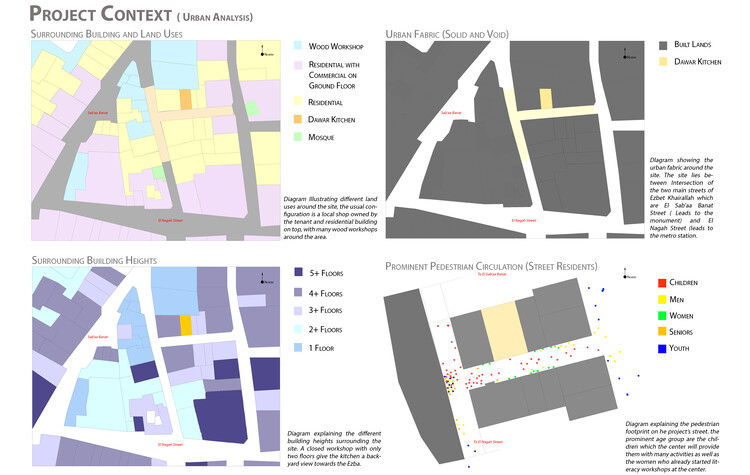
-
Architects: Ahmed Hossam Saafan
- Area: 350 m²
- Year: 2021
-
Photographs:Ahmed Hossam Saafan

Text description provided by the architects. Following the resonance of the Dawar El Ezba cultural center, a sprout of urban renewal has been released in the heart of Ezbet Khairallah. The project came out of a rigorous process of community participation to create a safe environment for kids, women, and men. Moreover, introduce urban innovations that could enhance their quality of life.The project’s approach was based on a series of community meetings in which the design input was indicated. On the other hand, methodologies of construction included utilizing materials and labor from the area itself to promote economic sustainability.



The project included a refurbishment of building elevations, infrastructure, street benches, pavers, landscaping, lighting, and a detachable multipurpose use kid’s area. The series of workshops were based on the imposition of the question “what is the street to you?” In a place like Ezbet Khairallah, the street is everything. At times, it’s the living courtyard for sitting and sharing, and at other times it’s a place for festivities on which the whole area is shifted into one big hall.


In the course of two years through this project, the identification of such a notion was constantly changing due to terms concerned with ownership, preference, and compromise. Moving on with the project, it came as a realization that basic necessities such as paving, infrastructure, and lighting were much more important than an introduction to new architectural languages. However, while working with the process, new ideas and paradigms were introduced to change the urban dialogue which is one of the core concepts of the Dawar el Ezba Cultural Center.



The design strategy focused on creating a palette on which very simple colors could be laid to tone down the set of un-patterned environments. Moreover, adding to an existing layer of murals and interventions to cut back on a limited budget as well as maintain a relatable identity. Subtle additions abstracted from traditional upper Egypt houses lined the windows, playful patterns of pavers incite the high population of children to interact, and simple wooden brick-laid benches affirm the “Mastaba” principle in old Egyptian houses. The street then becomes a living vibrant environment free from bad behavior such as drug use and harassment caused earlier by the deterioration of street elements.


This project is but a mere continuation of a growing sprout initiated by Dawar for arts and development and is proof of a growing possibility for Ezbet Khairallah in Cairo.
































